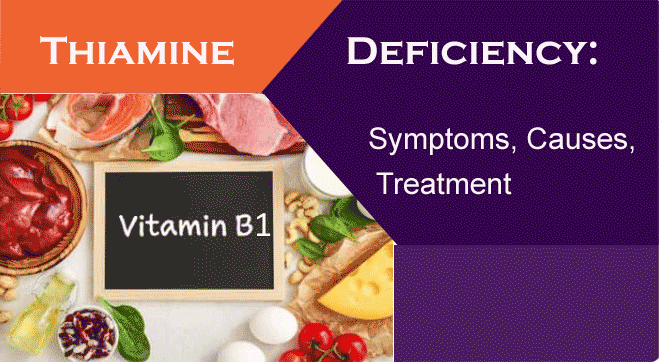Thiamine is an essential vitamin required by the body to perform numerous functions. A lack of vitamin B1 in the body can cause vitamin B1 deficiency and produce symptoms like loss of appetite, blurry vision, tiredness, nausea, and vomiting.
But what are the causes of thiamine deficiency, and is there a way to prevent it? The good news is that it is possible to treat thiamine deficiency with the help of thiamine-rich foods and thiamine supplements. In the sections below, we have described the symptoms, causes, and treatment of vitamin B1 deficiency. Read on for more.
Did you know:
- According to a report by the National Institutes of Health, a disease called beriberi, caused by vitamin B1 deficiency, results in 17% of infant deaths in Myanmar. It is, therefore, the second most widespread cause of death among babies aged between 29 days and 1 year in this country. 1
- Another survey on Cambodian mothers and children concluded that 15% of children and 27% of mothers had vitamin B1 deficiency. Among them, thiamine deficiency symptoms were more common in mothers than children.
- Wernicke-Korsakoff Syndrome (WKSB), another vitamin B1 deficiency disorder caused by thiamine deficiency in alcoholics, is commonly observed in people aged between 50 and 59 years. Reports suggest that it is more prevalent in men in comparison to women. 2
What is Thiamine (Vitamin B1)?
Vitamin B1, or thiamine, is an essential micronutrient your body requires to utilise carbohydrates to generate energy efficiently. Thiamine is soluble in water and supports your body in glucose metabolism as well as the smooth functioning of nerves, muscles, and heart.
Hence, to prevent thiamine deficiency, the recommended daily intake is— 1.2 mg (milligrams) for adult men and 1.1 mg (milligrams) for adult women. It is important to include thiamine-rich foods and supplements in your daily diet to reach these limits and avoid thiamine deficiency symptoms. 3
Common Thiamine Deficiency Symptoms (Signs of Vitamin B1 Deficiency)
Identifying thiamine deficiency symptoms is challenging because the signs of vitamin B1 deficiency are not distinct and usually don’t appear to be severe health issues. Hence, there is a high chance that you might ignore these symptoms initially, even when they persist for a prolonged period.
To identify and address vitamin B1 deficiency, you must first understand the symptoms. Here are 8 of the most common thiamine deficiencies symptoms—
1. Loss of Appetite
Loss of appetite is one of the earliest symptoms of thiamine deficiency people usually ignore.
When you have vitamin B1 deficiency, you might not feel hungry or lose interest in eating even your favourite foods. This is called loss of appetite, and it can eventually lead to unexpected weight loss.
Thiamine deficiency leads to appetite loss because one of the significant functions of thiamine is to regulate hunger and activate fullness cues in your brain. Therefore, this process gets disrupted when you don’t consume enough thiamine-rich foods. As a result, your brain cannot identify when your stomach is full or empty.
As a result of appetite loss, your body cannot get enough nutrients, eventually leading to unhealthy weight loss, which can be even more dangerous for your overall health.
2. Fatigue
Vitamin B1 deficiency makes you feel more tired than usual, resulting in fatigue that you can experience even in mild cases. Since thiamine is responsible for energy production in your body, its deficiency results in lower energy levels, ultimately making you lethargic and tired.
Although fatigue is one of the most easily identifiable symptoms of thiamine deficiency, it often goes unnoticed because it is also linked to many other diseases.
3. Irritability
Fatigue or tiredness caused by vitamin B1 deficiency can also cause negative mood changes. It often starts with feeling more irritable than usual or getting upset over the smallest things for no reason. In fact, irritability is also one of the most common thiamine deficiency symptoms among babies.
4. Nausea and Vomiting
Similar to fatigue, nausea and vomiting are two early thiamine deficiency symptoms that can be mistaken for other conditions. This is because these are the general symptoms observed in several other diseases like diarrhoea, indigestion, liver diseases, inflammation in the gallbladder, etc.
However, when it comes to vitamin B1 deficiency, nausea can easily lead to vomiting, which results in even more nutrient loss in the body. It can also indicate Wernicke Encephalopathy, a disease that occurs because of thiamine deficiency.
5. Nerve Damage
Vitamin B1 is an essential component that regulates the functions of nerves in our body. Beriberi is a serious adverse health condition associated with vitamin B1 deficiency. It causes severe nerve damage and can potentially lead to death. This condition is of two types—
- Wet Beriberi: It is a health emergency that can result in heart failure. Hence, it is essential to treat thiamine deficiency as soon as possible to reduce the risk of fatal outcomes like death.
- Dry beriberi: Dry beriberi is less dangerous than wet beriberi as it does not cause heart failure.
Regardless of the type, nerve damage is one of the most prevalent beriberi symptoms and causes the following problems—
- Faster Heartbeat
- Muscle weakness
- Losing sensation in fingers and feet
- Confusion
- Problems with coordination
- Lower body paralysis
- Difficulty waking up
- Tingling in the limbs
6. Paraesthesia
Extreme tingling in arms and legs, also known as paraesthesia, is one of the most serious beriberi symptoms. Paraesthesia damages peripheral nerves and is one of the most complicated thiamine deficiency symptoms associated with nerve damage.
7. Blurry Vision
Having thiamine deficiency symptoms for a prolonged duration but not taking the right thiamine deficiency treatment can make your condition worse and damage your eyesight.
Since vitamin B1 deficiency is associated with nerve damage, it can also damage the optic nerve. This results in blurry vision and, in extreme cases, complete vision loss.
However, research has shown that increasing the intake of foods high in vitamin B1 and taking the correct thiamine supplements can help to improve vision in such cases.
8. Delirium
Along with nerve damage and vision problems, delirium is also one of the most severe thiamine deficiency symptoms. It makes you feel—
- Confused
- Unaware of your environment
- Difficult to think properly
When the thiamine deficiency symptoms persist for a long duration, it can lead to a more severe problem called Wernicke-Korsakoff syndrome (WKS).
WKS often occurs as a result of thiamine deficiency in alcoholics and causes brain damage. In this case, thiamine deficiency and alcohol abuse lead to delirium, confusion, hallucinations, and memory loss. 4
Causes of Thiamine Deficiency
The primary cause of thiamine deficiency is a lack of thiamine in your everyday diet. It happens when your body does not get enough thiamine-rich foods for a long time.
But apart from this, the causes of thiamine deficiency also depend on the following factors—
1. Alcohol Misuse
Thiamine deficiency and alcohol are directly related because alcohol negatively interferes with the absorption and storage of thiamine in your body. Continued alcohol abuse is, therefore, one of the leading causes of thiamine deficiency in alcoholics.
2. Genetics
Some people might suffer from thiamine or vitamin B1 deficiency because of their genetics. Also known as genetic beriberi, this condition is one of the natural and unavoidable causes of thiamine deficiency.
In genetic beriberi, regardless of how much foods high in vitamin B1 you eat, your body will still not be able to absorb thiamine completely from them. Therefore, it is crucial to consult a doctor at the earliest to manage these symptoms.
3. Specific Health Conditions
Certain medical conditions can also be significant contributors to thiamine deficiency. Some of the most common conditions that lead to vitamin B1 deficiency and call for the need for medical intervention for thiamine deficiency treatment include—
- Diabetes
- Malnutrition
- AIDS (acquired immunodeficiency syndrome)
- Hyperthyroidism (Overactivation of the thyroid gland that leads to excessive secretion of the thyroid hormone)
- Pregnancy-related nausea and vomiting
- Prolonged diarrhoea
- Inflammatory bowel disease (IBD)
- Eating disorders
- Cancer
4. Use of Certain Medications and Medical Procedures
Two medical procedures that are the common causes of thiamine deficiency include—
- Bariatric (weight loss) surgery
- Kidney dialysis
Apart from this, a person using medicines like diuretics can also develop vitamin B1 deficiency. This is because diuretics are the type of medicines that make your body produce more urine and excrete more than usual. 5
Who is at Risk for Thiamine Deficiency?
The causes of thiamine deficiency are also its risk factors. Because of these risk factors, some people might be at a greater risk of vitamin B1 deficiency than others. Some of the common risk factors include—
- Age over 60
- Pregnancy
- Breastfeeding
- Kidney disease, AIDS, high blood pressure and hyperthyroidism patients
- Genetic beriberi
- Undergoing gastric bypass surgery, weight loss surgery, or dialysis
- Eating disorders like anorexia, bulimia nervosa, etc.
- Imbalanced diets that lack thiamine-rich foods
- Long-term alcohol abuse
- Excessive use of diuretics
- Infants whose breastfeeding mothers have vitamin B1 deficiency
Thiamine Deficiency Diagnosis
A thiamine deficiency diagnosis comprises the following tests—
1. A Physical Exam
A physical exam helps medical professionals understand behavioural and movement changes in your body. It is usually followed by laboratory testing to confirm the findings.
2. A Blood Test
There is an enzyme called transketolase that requires thiamine to carry out its functions. In the blood test, the activity of the transketolase enzyme is tracked. If there is decreased activity of this enzyme, then it indicates that there is a vitamin B1 deficiency in your body.
Thiamine Deficiency Treatment
Thiamine deficiency treatment involves incorporating thiamine-rich foods into your diet, along with taking thiamine supplements (if needed) according to your individual needs.
Here are some choices of foods high in vitamin B1—
1. Protein Sources
Vitamin B1 deficiency can easily be treated by taking a diet high in protein that includes thiamine-rich foods such as—
- Eggs
- Nuts
- Black beans
- Trout fish
2. Fruits and Vegetables
Thiamine deficiency treatment involves increasing your consumption of healthy fruits and veggies such as—
- Cauliflower
- Oranges
- Potatoes
- Asparagus
- Kale
3. Grains
One of the best ways to prevent beriberi symptoms and causes is to include grains in your daily diet. Here are a few examples of the best thiamine-rich foods—
- Whole grains
- Thiamine-enriched white rice
- Whole wheat flour
- Pulses
- Vitamin B1 fortified breakfast cereals
If you have severe vitamin B1 deficiency, your thiamine deficiency treatment might also require you to take thiamine supplements to restore adequate vitamin B1 in your body. Remember that it is important to consult an expert before taking any kind of thiamine supplements.
How To Prevent Thiamine Deficiency?
The best way to prevent thiamine deficiency is to follow a diet loaded with foods high in vitamin B1 (thiamine). Even though your body can get enough thiamine daily, it cannot store it all at once for long. That is why consistent intake of thiamine-rich foods is crucial to prevent thiamine deficiency.
Apart from this, some people might also require thiamine supplements to prevent vitamin B1 deficiency.
Conclusion
All in all, right from the mobility of your muscles to the regulation of your nerves, vitamin B1 plays a crucial role in your overall health. Hence, it is important to identify vitamin B1 or thiamine deficiency symptoms early on and take the right steps to prevent vitamin B1 deficiency and safeguard your health in the long run.








